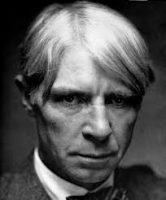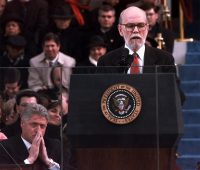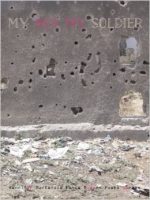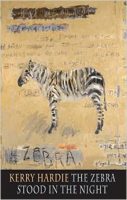January 6, 2015
Edited by David Sanders
Specimen Days
1488 – Helius Eobanus Hessus, German poet (Silvae), is born.
1728 – Domingos dos Reis Quita, Portuguese playwright/poet,, is born.
1878 – Carl Sandburg, US, poet/biographer of Lincoln (The People, Yes), is born.
1883 – Khalil Gibran, Lebanon, mystic poet (The Prophet, Broken Wings), is born.
1906 – Benedict Vilakazi, South Africa, poet/educator (Zulu-English Dictionary), is born.

Young Bullfrogs
Jimmy Wimbleton listened a first week in June.
Ditches along prairie roads of Northern Illinois
Filled the arch of night with young bullfrog songs.
Infinite mathematical metronomic croaks rose and spoke,
Rose and sang, rose in a choir of puzzles.
They made his head ache with riddles of music.
They rested his head with beaten cadence.
Jimmy Wimbledon listened.
—Carl Sandburg (1878–1967)
Carl Sandburg was born this week in 1878.
World Poetry
Poet, Dissident, Harvard Professor Stanislaw Baranczak Dies

One of Poland’s best-known poets, a dissident and a Harvard professor, Stanislaw Baranczak died on Friday. Aged 68, Baranczak died after a long debilitating disease in Boston, Massachusetts, Polish Radio reports. A poet, critic, literary scholar and theorist, Baranczak was well known as a dissident in the Communist era. In 1977 he was sacked from his job at the Adam Mickiewicz University in Poznan for his political activity.
He was the leading light of the “New Wave” poetry of the late 1960s, which sought to describe the dreary realities of the People’s Republic and expose the Newspeak of the Communist party.
Prize for Blood Libel Poet Cancelled Once and For All
The saga of Mifal Hapayis' (Israel's official state lottery) Landau Prize being given to radical leftist poet Yitzhak Laor appears to have finally reached a conclusion, after the Landau Fund Directorate stepped in on Monday morning and cancelled Laor's prize for good. There has been a popular uproar at the decision to award the radical poet with the 100,000 shekel (over $25,000) prize.
Acclaimed Poet Šalamun Dies

One of the most internationally renowned Slovenian poets, Tomaž Šalamun, died in Ljubljana on Saturday, aged 73, the daily Primorske novice reports on its web site. Šalamun was one of the most prolific Slovenian poets, having issued almost 50 poetry collections, which earned him numerous prestigious awards in Slovenia and abroad.
Egypt to Try Poet for 'Belittling Islam' in Critique of Sheep Slaughter
Egyptian prosecutors are bringing charging against a writer known for her secular opinions for violating the law by expressing sentiments 'disdaining religion,' Egypt's Al-Ahram newspaper reported on Saturday. The writer, Fatima Naoot, a poet and a columnist in independent newspaper al-Masry al-Youm, voiced criticism of the animal-sacrifice rituals practiced during Islam's Eid Al-Adha festivities on her Facebook page in October, calling it the "greatest massacre committed by human beings."
Feast of Poetry to Mark 150 Years since Yeats's Birth

Today sees the start of Yeats 2015 – a year-long celebration of cultural and artistic events marking the 150th anniversary of the birth of Irish Nobel prize-winning poet William Butler Yeats.A Sligo pub which was a favourite haunt of that other famous Irish poet, Seamus Heaney, has already taken bookings six months ahead of a novel endeavour which will see punters recite their favourite Yeats poem every day of the festival. Hargadon's in Sligo was built the year before Yeats was born. It is inviting anyone to put their name down to read a poem of their choice at 1pm every day of the Year of Yeats – apart from Good Friday and Christmas Day.
One of Poland’s best-known poets, a dissident and a Harvard professor, Stanislaw Baranczak died on Friday.
Recent Reviews
Claudia Rankine’s ‘Citizen’

by Holly Bassdec
In light of the national demonstrations over the Michael Brown and Eric Garner cases, it’s tempting to describe “Citizen,” Claudia Rankine’s latest volume of poetry, as “timely.” Even the cover image of a floating hoodie, its sleeves and torso cut away, seems timely. Any American viewing it would immediately recall a certain black teenager who was shot and killed by a neighborhood watch volunteer in February 2012. But this work, by the artist David Hammons, was created in 1993 — well before Trayvon Martin was even born.
The Letters of TS Eliot, Volume 5: A Commanding Figure
by Denis Donoghue
TS Eliot converted from Unitarianism to the Anglican communion and was baptised on June 29th, 1927. He applied for, and was granted, British naturalisation papers a few months later, on November 2nd. The two decisions were closely related. “It is all right for Britons to be Papists when they have been so since before Henry VIII consecutively, but I should think it unseemly for a naturalized British subject to support any but the church as by Law established.” The evidence suggests that the poet was an extremely devout Anglican and deeply concerned about the health of the English church.
The Intrigue of Rosemary Tonks
by Hilary Davies
“Why do poets ‘disappear’?” The question easily piques the post-Romantic imagination. A garret, perhaps? Starvation? Suicide? Or the terrifying desertion of the creative capacity? The reality is always more complex, though perhaps no less spectacular, than these. When poets are said to have disappeared they are often in fact to be found in obscurity, still devoting themselves to their art in the face of indifference, misprision or even contempt. Such was the case of W. S. Graham, for example, who, legend had it, was believed dead even by his publishers, though in fact living both literally and figuratively on the edge, where sea meets land, in Zennor, Cornwall. Or Anna Laetitia Barbauld, who severely misjudged circumstance and prevailing opinion with her satire “Eighteen Hundred and Eleven”: publishing a poem in 1812 which dwelt on the terrible personal cost of the Napoleonic Wars and predicted Britain’s eclipse by the United States cost her her literary career, and she never published again.
The Edge of Utterance
by Tiffany Atkinson
Michael Longley once remarked that “most good poetry is written by young people or old people”. As readers embrace the 2014 ‘Next Generation’ poets for the freshness and promise of new voices, it is salutary to hear, from an older generation, a contrasting set of chords, whose force comes less from novelty than from the confidence and polish of decades of acclaimed practice. Glück and Longley are surely household names for poetry readers on both sides of the Atlantic: Glück, based in Cambridge, Massachusetts, lists among her many accolades the Pulitzer Prize and the twelfth U.S. Laureateship, while Longley, longtime resident of Belfast, has, among multiple honours, been awarded the T.S. Eliot Prize and the Queen’s Gold Medal for Poetry. These are respectively their thirteenth and tenth collections, and they share an elegiac tone, through which is folded a sense of wonder at both the observed and felt worlds, and the silences at the edge of utterance.
New Books by Gluck and Mehigan
by Ian Pople
Louise Glück has an astonishing record in the US having been awarded almost every poetry prize there is. Her last book, Poems 1962-2012, was garlanded with praise in every review it received. In the UK, this new book, Faithful and Virtuous Night, has been shortlisted for the T.S.Eliot award. Her writing is noted for its sparse lyricism and the way it takes a scalpel to familial relationships of every kind: between children and parents, between spouses, and between siblings. Above all, poetry which might seem confessional is driven by Glück’s intelligence and sheer intellectual reach, so the poems are very far from theatrical.
In comparison, Joshua Mehigan is a relative newcomer to the American poetry scene, whose Accepting the Disaster is his second full collection. This book, too, has received high praise. From its title, with its clear genuflection to Elizabeth Bishop, we might assume that Mehigan’s poetic temperament was a kind of opposite to Glück’s.
“When I hit him he comes apart like a perfect puzzle”: On Phil Levine’s “Angel Butcher”
by Johannes Göransson
For a poet that later became known for his poems that supposedly authentically depict working class factory life in the Detroit factories, Levine’s early poetry is almost allegorical – complete with the kind of poetic artifice that is generally believed to be opposed to the authentic. For one thing, it’s full of angels! This might be the last figure one might least expect to find in authentic depiction of factory work.
'Splitting an Order' Offers Poetry that Outshines Dark Days
By Elizabeth Lund
As December draws to a close, many people think about endings, the future, and celebrating light during the darkest days of the year. If that includes you, consider greeting 2015 with a copy of Ted Kooser’s Splitting an Order, a quiet collection that honors small victories and gives reasons to be hopeful. The book – Kooser’s 13th full-length collection of poems – introduces all of those elements in the first pages before exploring them at length in the next three sections.
It’s tempting to describe “Citizen,” Claudia Rankine’s latest volume of poetry, as “timely.
Broadsides
Remembering Tomaž Šalamun
by Christopher Merrill
When Tomaž Šalamun arrived at a poetry festival in San Miguel de Allende two years ago with a bad back, which he had hurt tobogganing down the Great Wall of China, I was not surprised to learn that he had risked life and limb to have a little fun. The Slovenian poet seemed to possess the gift of eternal youth until he passed away on Saturday, at his home in Ljubljana. He was always alert to what young poets were doing — they fed his imagination — and they repaid him in kind with translations and imitations of his work; it is a great irony that although he wrote in a language spoken by less than two million people English versions of his poems have for several decades profoundly influenced American letters. What surprised me about his Chinese adventure was that he had not escaped unscathed. I had imagined him to be indestructible.
Ada Limón’s “The Rewilding,” or Narcissus at the Woodline
by D. Eric Parkison
Ada Limón’s poem “The Rewilding” is confusing in an irksome rather than invigorating way, and is unable, finally, to give the speaker’s serious ideas the voice they deserve. On first read, one senses a politics that wants to break out, a problem seeking to be solved rather than merely beautified. Approaching the piece again, one senses only that the various directions the piece tries to take aren’t, individually, given the room they need to develop, nor the time they deserve—ironic for a poem about ‘rewilding.’ This will be the key rub for Limón’s speaker, and for us as readers: how closely must form attend subject(s) in a poem that wants to ‘make wild again’?
The poet Tomaž Šalamun seemed to possess the gift of eternal youth until he passed away on Saturday.
Drafts & Fragments
Unlocking the Inner Poet: How Poetry Helps People With Dementia

By Kristine Crane
People who suffer from dementia and Alzheimer’s disease are constantly reminded of the things they may not remember – from what time to take their medications, to what they once did to make a living, to who their own children are. It’s hard to imagine what that must feel like, but one can surmise it’s not very good. If instead the focus was on what these people can still do, or even discover for the first time, their quality of life would arguably improve. With this in mind, Molly Middleton Meyer, a Dallas, Texas-based journalist, decided to make poems with people suffering from dementia and Alzheimer’s.
Tights with Poetry
by Cory Doctorow
The View Text Etsy store sells custom tights emblazoned with poetry from the likes of Emily Dickinson and Shakespeare (you can also get your own text on a pair).
Poetry App Matches Verse to Weather
by Denise Hill
Poetry East has introduced its new app, The Poet's Almanac, available for free download on iOS and Android devices. This unique app analyzes the weather report and couples it with Poetry East's customized archive to create a new way for users to discover and engage with poetry every day.
The Year in Poems
by Elisabeth Denison
Every year, The New Yorker publishes approximately a hundred original poems, by longtime contributors and by emerging poets, in the original English and in translation. (Subscribers can browse the complete poetry archive.) Here are a few highlights from 2014.
Recently a Texas-based journalist, began writing poems with people suffering from dementia and Alzheimer’s.
Poetry In the News
Miller Williams, Laconic Arkansas Poet, Dies at 84

Miller Williams, a poet who championed the power of everyday language and who delivered a poem at the Capitol for President Bill Clinton’s second inauguration, died on Thursday in Fayetteville, Ark. He was 84. The cause was complications of Alzheimer’s disease, said Linda Sheets, a family friend. The father of the singer and songwriter Lucinda Williams, he would occasionally share the stage with her, reading his poetry between her songs.
Pure Poetry: Resident Barbara Allen Creates Palo Alto's First 'Poetry Post'

Palo Alto native Barbara Allen has loved poetry since childhood. Raised by an aunt who lived on Coleridge Avenue, she played along streets named for some of the world's most celebrated poets: Tennyson, Melville, Coleridge and Emerson. As a teen, Allen often read poetry to her Aunt Dickie, who lived down the street, as the elder woman's sight failed, she said.
Ohio to Get Poet Laureate under Bill Kasich Signed
Ohio will join 44 other states and the District of Columbia in establishing a state poet laureate. The measure was one of 40 bills Gov. John Kasich signed on Friday. The bill from Cincinnati Democrat Eric Kearney would allow the governor to select the poet laureate from a list developed by the Ohio Arts Council. In the role, the poet laureate would work with the arts council on programs promoting literary arts and encouraging the creative interests of Ohioans.
Massachusetts Poet Laureate Designation Long Overdue, Says State Rep. Peake
If state Rep. Sarah Peake has her way, Massachusetts will soon join the rest of the New England states and most other states in the nation with its own poet laureate. Peake, of Provincetown, originally submitted House Bill 2999 in January 2013, but it died in the House Ways & Means Committee during the past two sessions. It is currently in the house committee on bills in third reading awaiting action before the session ends on Jan. 5, 2015.
Miller Williams, a poet who championed the power of everyday language, died on Thursday in Fayetteville.
New Books
The Meaning of the Shovel by Martin Espada
[Paperback] Smokestack Books, 94 pp., $20.00
Martin Espada has worked as a bouncer, a primate caretaker, a door-to-door encyclopedia salesman, a gas station attendant and a tenant lawyer. As a poet, he acts as an advocate for the Latino community in the United States, particularly the immigrant working class, from farm workers sprayed with pesticides in the field to the kitchen staff who died in a restaurant at the top of the World Trade Centre on September 11, 2001. The Meaning of the Shovel brings together, for the first time, all of Espada's poems about work, including several previously unpublished poems. It is a book about the emotional and often invisible landscape of labour, about 'hard-handed men', 'the rude Mechanicals: the tailor, the weaver, the tinker, the bellows-mender.' The title poem, based on the poet's experience of digging latrines in Nicaragua, embraces a vision of revolutionary change.
My Not-My Soldier by Jennifer Mackenzie

[Paperback] Fence Books,136 pp., $15.95
Jennifer Mackenzie's debut is an unfettered travelogue of embodied intellect and flights of gorgeous observance.
Already the Flames by Clive Watkins
[Paperback] Waywiser Press, 136 pp., $18.00
Clive Watkins's powerful second collection is by turns sensuous, somber, lyrical, and discursive. Already the Flames explores the position of those complicit in suffering or compelled to observe it in a world that appears ruled by malice or chance. Hauntings, entrapment, and escape are themes that weave in and out. The book moves towards an ambiguous release in the realm of the personal. The collection is remarkable for its formal range: poems, and sequences of poems, in free verse, in prose, and in rhymed and unrhymed meters of various kinds.
Textu by Fady Joudah
[Paperback] Copper Canyon Press, 118 pp., $15.00
Emerging in the era of tweets and text messages, poet Fady Joudah has invented a new poetic form: textu. The "u" in textu echoes the one in haiku, and also emphasizes the intimate you. A textu poem has a single rule: be exactly 160 characters long. As theme, form, and style are wide opened, a textu reveals new possibilities and poetry in unexpected ways.
The Zebra Stood in the Night by Kerry Hardie

[Paperback] Bloodaxe Books, 80 pp., $26.00
Human life, the passage and rhythms of time, and the seasons come together in The Zebra Stood in the Night, the seventh collection by one of Ireland's leading poets. Grounded in the natural world, this is a book about landscape, loss, belonging, and transformation. As everything in nature grows and decays, so `everyone is always inside the act of dying at the same time as being inside the act of living,' Hardie writes in her essay `Aftermath,' a meditation on grief which precedes a sequence of poems on the death of her brother in India.
Do Not Rise by Beth Bachmann

[Paperback] University of Pittsburgh Press, 72 pp., $15.95
“Beth Bachmann’s Temper was the last time [in forty years] I remember reading a first book by a poet so prodigally and—the word that came to my mind was—severely gifted. The new poems in Do Not Rise are a quantum leap forward with all the metaphorical leaps, adumbrations, dizzyings, deft, brief knottings that make the poems in Temper so dazzling. A remarkable young talent, and a scary one.”
—Robert Hass
The Spectral Wilderness by Oliver Bendorf
[Paperback] Kent State University Press, 88 pp., $15.00
It s a joy. . .to come nearer to a realm of experience little explored in American poetry, the lives of those who are engaged in the complex project of transforming their own gender… Oliver Bendorf writes from a paradoxical, new-world position: the adult voice of a man who has just appeared in the world. A man emergent, a man in love, alive in the fluid instability of any category. —Mark Doty, from the Foreword
Swimming in the Rain: New and Selected Poems 1980-2015 by Chana Bloch

[Paperback] Autumn House Press, 220 pp., $19.95
Chana Bloch has spent her life writing the poems of a grown woman, loving the world as she interrogates it mercilessly, speaking a truth that hurts as it heals. "Half the stories/ I used to believe are false," she confesses. "Thank God/ I’ve got the good sense at last/ not to come in out of the rain." A thrilling collection. —Dorianne Laux
The Novel by James Reiss
[Paperback] WordTech Communications, 82 pp., $18.00
If James Reiss wants "to jostle a reader's heart / into snare drumming for bit / players on side streets," the poems in The Novel reach for rhythms right around the corner. Whether you're waiting for a bus or busing tables as a waiter, these poems' characters, their storylines, are part of an underground bestseller that will make you tap your feet and clap your hands.
The Volta Book of Poets edited by Joshua Marie Wilkinson
[Paperback] Sidebrow Books, 367 pp., $25.00
The Volta Book of Poets gathers together the work of 50 talented poets of disparate backgrounds and traditions, providing a constellation of the most exciting, innovative poetry evolving today. Named for the online poetics archive The Volta, The Volta Book of Poets navigates contrasting styles and forms to showcase poetry in its dissimilar pleasures, presenting difference as a means for inspiring a new way to think about poetry, and to inspire readership for the poetry communities and presses radiating out from the poets collected here.
Jennifer Mackenzie’s debut is an unfettered travelogue of embodied intellect and flights of observance
Correspondences
Small Press Spotlight: Danez Smith

by Rigoberto González
Danez Smith is the recipient of a 2014 Ruth Lilly & Dorothy Sargent Rosenberg Poetry Fellowship from Poetry Magazine & The Poetry Foundation. He is also the recipient of fellowships from the McKnight Foundation, Cave Canem, VONA, & elsewhere, and the author of the chapbook hands on ya knees (Penmanship Books, 2013). He holds a BA from UW-Madison, where he was a First Wave Urban Arts Scholar. He lives in Minneapolis, MN.
Science Fuels Writing, and Faith, of a Nicaraguan Poet
By Elisabeth Malkin
Ernesto Cardenal is a poet and a priest, a revolutionary and a mystic. His poetry speaks of Marilyn Monroe and Charles Darwin, of Spanish conquistadors and pre-Columbian gods. Science saturates his writing.
“Science brings me close to God because it describes the universe and creation, and that brings me close to the creator,” said Nicaragua’s most prominent living poet in an interview a few weeks before his 90th birthday. “For me this is a prayer.”
Danez Smith is the recipient of a 2014 Ruth Lilly & Dorothy Sargent Rosenberg Poetry Fellowship.
Envoi: Editor’s Notes
Lessons from the Past: Rosemary Tonks

Romantics (and not only romantics) tend to be lazy about first principles. By a continuous process of effort on many levels, a poem is shaken free from all that is not the poem. This is the first step, done if possible well away from a sheet of paper. It is the work; brutal, classical precision work to isolate, develop, and organize. Everything important is decided there and then, in order to get a poem out alive from the rapid, egocentric thought-flow of the normal mind. It’s especially hard on lyric-romantic writers who have already swallowed the world and all its poets entire. Every burr sticks to their verses.
—from “Cutting the Marble” in Bedouin of the London Evening
“Romantics (and not only romantics) tend to be lazy about first principles.” –Rosemary Tonks